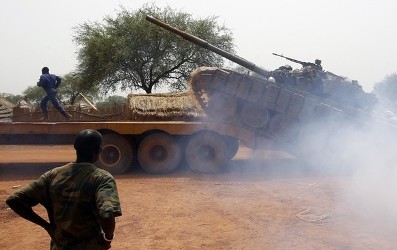Amnesty accuses Sudan, China and Ukraine of fueling S. Sudan conflict
June 27, 2012 (JUBA) – Amnesty International on Thursday accused China,
Sudan and Ukraine of allegedly supplying military weapons to both
South Sudanese Armed Forces (SPLA) and opposition groups, triggering
scores of indiscriminate attacks in parts of South Sudan.

supplies fueling violations in forgotten conflict, examines the impact
of responsible supplies and misuse of weapons, munitions and armaments
that resulted in to civilian casualties and displacement of people in
Mayom County, Unity State.
The report, released on 28 June, specifically points fingers at the
SPLA and South Sudan Liberation Army (SSLA); an armed opposition
entity for killing and injuring innocent civilians, while their homes
were either destroyed, or their occupants forced flee due to
unselective attacks on civilian areas in 2010 and 2011.
Amnesty International, however, calls for a “strong” and “robust”
treaty that halts irresponsible arms transfer to those likely to
violate human rights and commit war crimes, through misuse of these
arms. The call comes ahead of crucial Arms Trade Treaty negotiations
to be graced by world governments at the United Nations headquarters
in New York, next month.
“Governments must immediately stop supplying South Sudan with
conventional arms which have been used to commit violations of
international humanitarian and human rights law until adequate systems
of training and accountability are in place,” said Erwin van der
Borght, Amnesty International’s Africa Director.
Amnesty International, in its report, also documents a series of human
rights violations allegedly engineered by these three named countries
believed to have supplied a range of weapons and military equipment.
For instance, it cites the Pristine 2010 Sudanese-manufactured
ammunition allegedly used by the armed opposition; Chinese
manufactured anti-vehicle mines freshly laid on Unity State’s roads
and Ukrainian-supplied T-72 main battle tanks allegedly by South Sudan
armed forces to indiscriminately shell civilian settlements.
“There have been repeated incidents of civilians being killed or
injured during fighting between the SPLA and the SSLA. Residents
described a pattern of indiscriminate firing and shelling,” the report
reads in part, while adding that communities’ alleged support for
armed opposition could have justified the SPLA attacks on these
civilians.
In 2009, according to Amnesty International, there was a concealed
delivery of battle tanks from Ukraine to South Sudan, which reportedly
involved transfers via Kenya and Uganda and included shipping
companies from Germany and Ukraine, and UK and Isle of Man-registered
shell companies.
Meanwhile, evidences gathered, including testimonies allegedly
obtained from a former senior SSLA member indicates armed opposition
groups received significant numbers of Kalashnikov-type assault rifles
“new from the boxes,” as well as ammunition, light and heavy
machine-guns, B10 recoilless rifles plus mortars.
The conflict in Mayom County, Amnesty International said, underlines
the need for governments to agree an effective Arms Trade Treaty
(ATT), adding that an effective ATT requires an injunction on transfer
of arms likely to be used to commit serious human rights violations.
“The ATT talks are an unprecedented opportunity to stop arms getting
into the hands of human rights abusers. A strong treaty could help
prevent many other communities suffering from the horrific cost of the
irresponsible arms trade, in the way the people of Mayom County have,”
said van der Borght.
SPLA REACTS
Phillip Aguer, the spokesperson for the SPLA described the Amnesty
report implicating the South Sudan army as “bias” and “unrealistic”.
“The SPLA has the mandate to protect the people of South Sudan. There
is no way it can use arms and weapons used meant to protect the
population for attacking and displacing civilians. It does not happen
anywhere,” Aguer said.
The army, he added, remains skeptical about the evidence provided by
Amnesty International especially on the weapon allegedly used by the
SPLA, while refuting reports that the army turned on civilians due to
their alleged support for armed opposition.
(ST).

